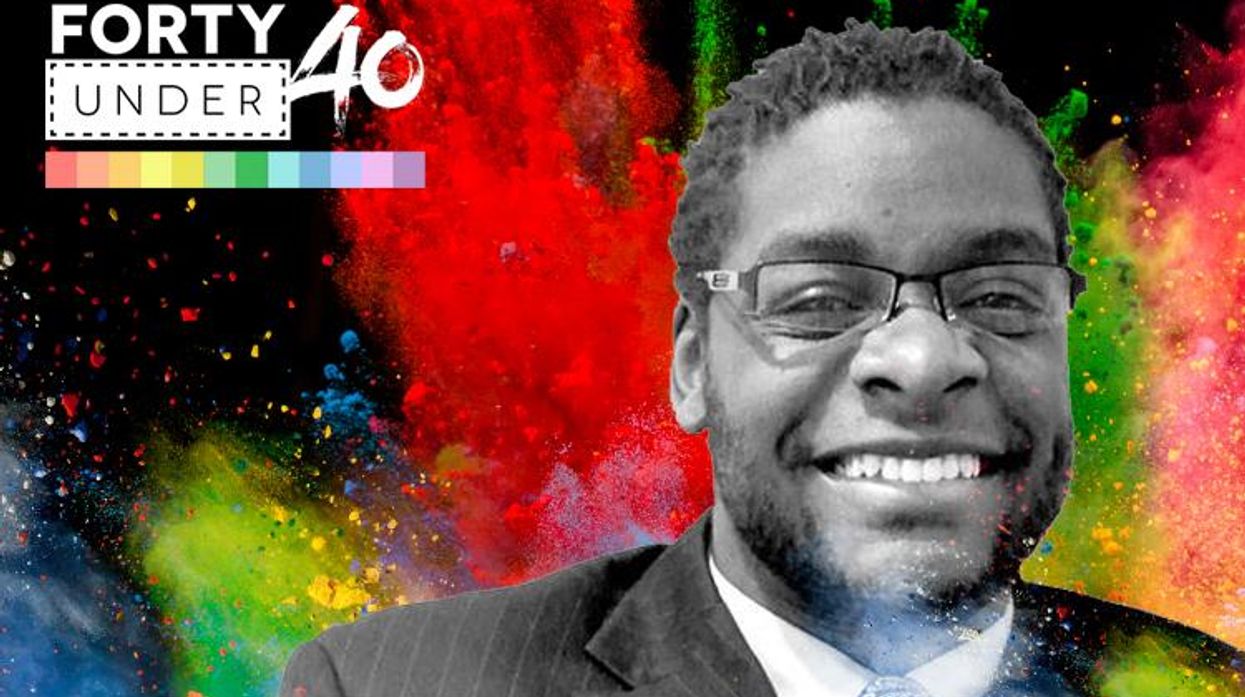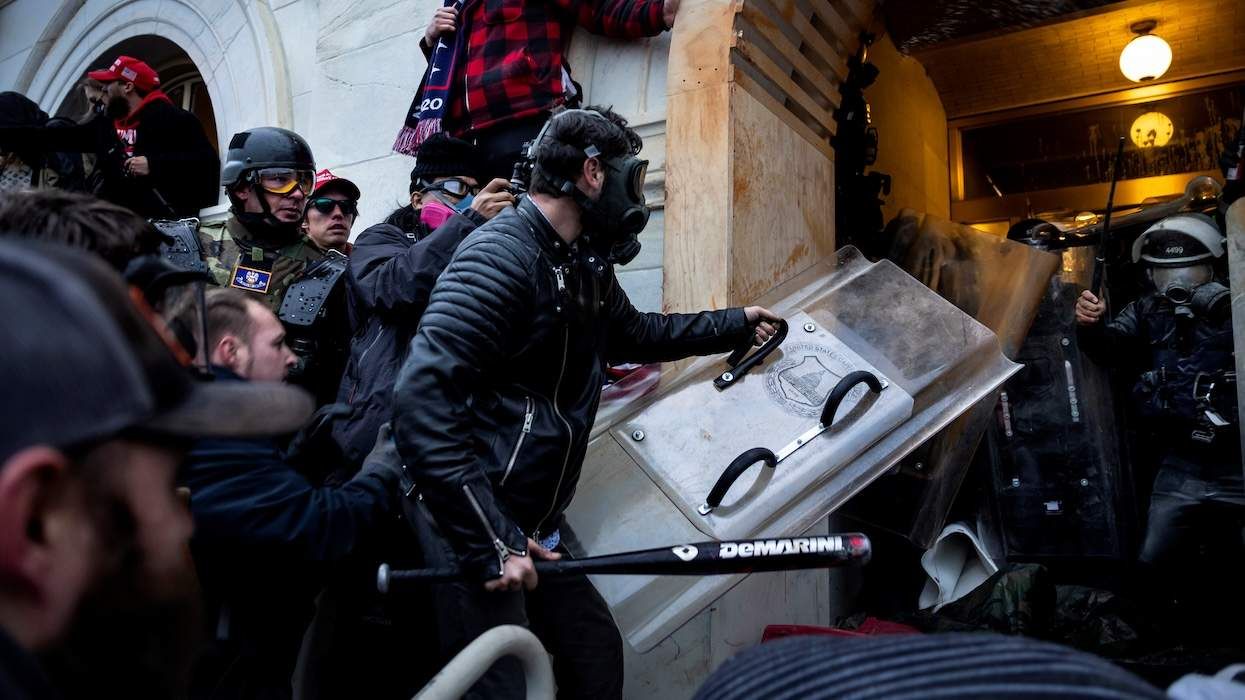D'Arcee Charington Neal doesn't like talking about "the incident." Being forced to crawl off a plane because United Airlines flight attendants failed to bring an aisle-size wheelchair to assist the 29-year-old gay man with cerebral palsy was "humiliating," he says.
But out of that humiliation -- and the attention directed toward Neal as his story went viral -- Neal has emerged as a powerful voice for disability rights in Washington, D.C., and beyond.
"I've spent my entire life, obviously, being black, gay, and disabled," he explains. "And as much as one might want to pick a thing and choose, you don't really get the opportunity to do so."
In fact, his current position as a correspondence specialist for the U.S. Department of the Interior marks a departure in Neal's professional life from formalized advocacy for disability rights. He spent three years as the manager of institutional giving at United Cerebral Palsy and before that served as a youth advocate for the Alliance of Disability Advocates' Center for Independent Living in Raleigh, N.C.
The "incident" occurred less than a month after Neal started his job at the Department of the Interior, but it has catapulted him to a notoriety that he hopes will allow him to effect real change.
Shortly after his story went viral, Neal was contacted by the Raben Group, a prominent public relations agency in D.C. that focuses on social justice and policy reform. In a private meeting with the head of the organization, Robert Raben, Neal says the PR firm was eager to hear his suggestions on how to improve the quality of life for disabled Americans, and especially interested in Neal's ability to speak to LGBT people who are disabled.
Although he's long been active in LGBT social and advocacy groups -- he's currently a baritone in the Gay Men's Chorus of Washington -- Neal says he's never found an environment that is fully supportive of or educated about what it means to be a gay disabled person in America.
"I think the disability and [being] LGBT are two of the biggest factors in my particular life," Neal says. "I would go to LGBT groups in high school and college, and it was always one thing or another. It was never directly addressing two of the big things."
So he's setting out to change that. With the support of the Raben Group and a growing coalition of allies, Neal hopes to create the nation's first social justice group by and for LGBT people with disabilities. Although still in its early stages, Neal says he's all but settled on the name Oracle, after the female Batman sidekick that Neal describes as a "beat-yo-ass paraplegic, making her the first iconic mainstream disability character" beyond X-Men's Professor X and Daredevil.
The idea for the first-of-its-kind group began percolating in earnest after a friend called Neal and asked him for suggestions of Washington-based groups that work with disabled LGBT people. Neal was forced to tell him there were no such groups.
"D.C. is such a gay-friendly city, why doesn't this exist?" Neal asks. "We've got to do better. Because I can't fathom how the city can have all these people in it, and do all these wonderful things, and they have all these bars that are inaccessible."
While he's adamant that the group he creates will establish a safe space for LGBT folks with disabilities, he's equally insistent that the environment will not become a "sterile business group."
"That's not the point," he says. "I want people to get empowered. I want people to have hookup sessions. I want people to get married. I want people to meet other people and get out of the house, get connected to all of the things big cities have to offer."
He envisions the group starting locally, then eventually expanding to have chapters in major cities nationwide. He's eager to draw on his managerial experience in disability nonprofits to enact meaningful programs through his group, including a mentoring program that would pair disabled LGBT high school students with adults who have survived being disabled and queer in high school. Neal describes his own time in high school as "miserable."
"I honestly believed that as an LGBT person with a disability, nobody was ever going to love me, and nobody was ever going to appreciate me," he says. Just having someone who understood the experience would have been life-changing, he says.
As it was, Neal did not meet another LGBT person of color who was also disabled until 2009, when he traveled to Costa Rica with a group called Mobility International. To this day, even in progressive D.C., he says he can count his LGBT friends of color on a single hand.
Speaking to that lack of visibility even in the nation's capital, Neal is equally frustrated that mainstream LGBT groups have failed to advocate for those living at the intersections of multiple identities.
"I feel like diversity, it only extends so far," he laments. "For those of us who inhabit multiple parts of it, it's difficult to hear about organizations that supposedly represent Us, with a capital U, and don't. And so if the [Human Rights Campaign] isn't going to talk about it, then I will. If GLAAD isn't going to do something about it, then I will."
Changing this harsh reality requires redefining a key tenet of the so-called LGBT movement, Neal argues. While LGBT groups often shout the virtues of equality from the rooftops, the programs offered don't reflect the community, he says.
"Equality should have a capital E," says Neal. "And that includes everyone. The word 'equal' is in equality. Equality is about making sure the right people get represented so that everyone is standing on the same playing field."
He's also painfully aware that the LGBT community and so-called gay spaces are by no means automatically safe and welcoming environments for people with disabilities. In a November op-ed for The Advocate, Neal recounted how a friend at a gay club told him that he would never hit on Neal, because anyone seeing the men exchange information would know "it's a pity lay." "The only way I'm giving my number to you is in the dark, where no one can see," Neal's former friend continued. While Neal's group of friends gasped at the cruelty of the comment, he points out that no one contradicted the man's pointed declaration.
"You wouldn't think people would be bullied inside a gay club," Neal says, frustrated. "It should actually be a safe space. But there are many times when I've gotten snide comments lobbed at me just because I happened to have the nerve to be there."
Even getting to the club can be a headache for disabled folks, Neal explains. On a recent trip to his local gay watering hole, Neal says, the taxi driver was perplexed by his destination.
"But you're in a wheelchair, though," Neal recalls the driver telling him. "Why do you want to go there?"
That should never be a question, Neal contends. And he's already working to find ways for disabled people to better navigate the nation's capital. Uber this month announced a new add-on to its ride-sharing app that allows customers in the D.C. area to filter potential rides by whether the car can accommodate a wheelchair. Neal was not only involved in the planning of the new UberTaxi "Wheelchair" option, he was the first person to use the new feature, on December 11, as Uber's "Rider Zero."
But with each move toward progress, Neal knows there will be setbacks. In fact, he was returning from a meeting with Uber officials in San Francisco about the new option in October when "the incident" occurred at Washington, D.C.'s Reagan International Airport.
The irony is not lost on him, but Neal remains steadfast, ready to have the hard conversations required to create change.
"It kind of sucks to be the first," Neal admits, acknowledging that he's unable to "hide" his disability, which prompts folks to ask inappropriate questions and consider him a universal educator. "But if I'm going to do that, I'm glad I was able to enlighten you."
















